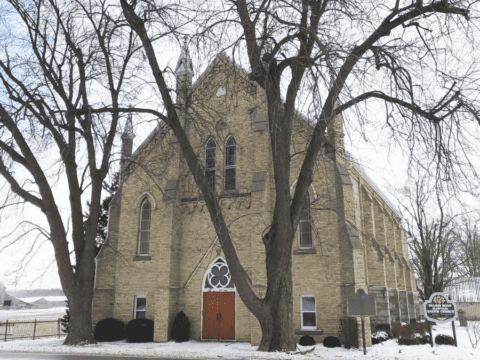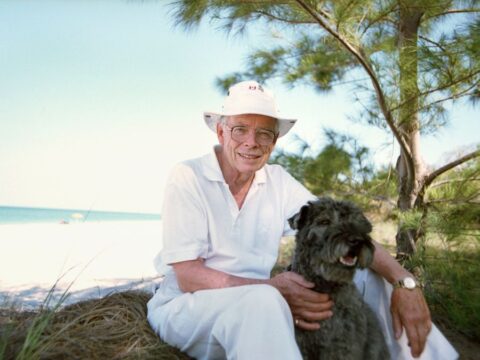
Rev. Susan Beaver, 53, was nominated by Plains Presbytery. She is the minister at Grand River United in Ohsweken, Ont., and is on leave as part-time personnel minister for the All Native Circle Conference. She was ordained in 2014 after serving as a lay reader and student minister at her current pastoral charge.
You may unsubscribe from any of our newsletters at any time.
Beaver is Kanien’kehá:ka and grew up on the Six Nations of the Grand River reserve. She began her career serving mostly in Indigenous and queer organizations and felt called to the ministry while working at the Frances Sandy Theological Centre in Paris, Ont.
Beaver credits the late Rabbi Zalman Schachter-Shalomi, one of her professors at a Buddhist university in Boulder, Colo., with reigniting her faith in God. She had left home after coming out to her mother as a lesbian, but says that she and her longtime partner, Tannis Atkinson, were welcomed from day one when she returned to the congregation she grew up in and now serves. “I am here to say a spiritual life in community with God and each other in the church brings us as individuals incredible gifts and potentially leads the world toward justice.”
Beaver has served as chair of Great Lakes Waterways Presbytery and on its council of learning, as a General Council commissioner and as a member of the Caretakers of Our Indigenous Circle.
“There are lots of challenges before us,” she says. “We still need to rely on God. We can have faith and hope for the future of the church if we are truly doing the Creator’s work — and have faith in each other.”

Tessa Blaikie Whitecloud, 29, was nominated by Winnipeg Presbytery. She is executive director of 1JustCity in Winnipeg, an umbrella organization for four United Church-related outreach sites that provide meals, personal care, shelter and other programs.
“Every day I see our church’s work grow,” says Blaikie Whitecloud. “I see the need for love in the world grow, and I see our ministries respond and rise up to meet that growth. It’s inspiring.”
A layperson, she is the daughter of retired NDP politician Rev. Bill Blaikie and an active member of Transcona Memorial United, where she led Sunday school and youth groups. She served on a Youth for Peace group visiting Palestine and Israel in 2009 and as a church overseas worker in Trinidad for two months in 2011. With her husband, Hanwakan Blaikie Whitecloud, she runs reconciliation workshops in Manitoba congregations.
The United Church is “rightly apologetic about the ways we have made mistakes,” she says, but it also needs to share “our living of the Gospel in ways that grab those with a spiritual hunger seeking a radically inclusive and progressive faith community.”
She wants the church to reclaim “a voice that says the highest spiritual life is to be found in community and in communities that pursue God’s passion for justice.”
For Blaikie Whitecloud, “faith is action, and how we show and live our faith is by doing a lot of that work to make sure that the least and the last are in our thoughts and prayers. But also in our actions, in the outcomes of the way we carry ourselves.”

Rev. Richard Bott, 49, was nominated by Vancouver South Presbytery. He is the congregational development minister at Pacific Spirit United in Vancouver. Ordained in 1994, he has served congregations in northern and southern Ontario and the lower mainland of British Columbia.
He writes prayers and litanies for Gathering (the United Church’s worship planning magazine), and he moderates a Facebook page for about 700 younger United Church clergy.
“I’ve got a continuing sense of hope and wonder about who God is inviting us to be and a sense of excitement about the many different ways we live into the mission and ministry of being disciples of Jesus,” he says. “I want to help us inspire each other to live deeply into the relationship God has with all Creation, and into the relationship we have with God.”
Bott has chaired Huron-Perth Presbytery and has served as president of London Conference and on various General Council and Conference committees, including the current Mission & Service advisory committee. He has also facilitated workshops and worship services across the church.
“Our greatest issue is our fear in the face of uncertainty,” says Bott. “We have this sense that we’re dying off or that we’re failing.” To stand up to this fear, we need to “live into what we understand we’re called to be,” he says. “We need to turn to one another and be heavenly messengers by saying, ‘Don’t be afraid! There is good news and great joy!’ It’s time to figure out what your call is, as individuals and communities — dive in and live it.”

Rev. David Hart, 63, was nominated by Halifax Presbytery. He has been lead minister at Bedford (N.S.) United, in a suburban community near Halifax, for 25 years. Ordained in 1982, he previously ministered to congregations in Toronto, Saskatchewan and northern Ontario, and then served as staff personnel and global justice minister of Manitou Conference.
Hart says he offers “learning and wisdom I have gleaned regarding how to nurture the congregational base of our denomination in truly healthy and life-giving ways.” He says his “articulation of faith and Spirit, which relies deeply on an interdisciplinary and interfaith examination of life, seems to speak very powerfully to people.”
Mainly focused on his congregation in recent years, Hart helped with restructuring Halifax’s Brunswick Street Mission and currently co-chairs a church children’s camp. Earlier, he organized anti-apartheid efforts in northern Ontario with the Division of World Outreach.
“If we are to survive as a denomination, we need to develop the capacity to foster and nourish living, dynamic communities of faith that will also support the wider structure and ministry of the denomination,” he says. This shift will require “much more sophistication and skill in the present-day context than it ever has in the past.”
In the midst of the current restructuring project, says Hart, the church needs encouragement and a spirit of optimism. “At this point in our life, I believe the church also has to renew its sense of corporate identity and the role it wishes to play in the world going forward. . . . The moderator can help to facilitate such a process.”

Rev. Cathy Larmond, 55, was nominated by Kent Presbytery. Since her ordination in 1988, she has served rural and small-town pastoral charges in southwestern Ontario. Currently, she is a minister at a two-point charge in Tupperville, Ont.
Small communities “are where the roots of the church exist,” she says. Through her time in the church, she says she has learned to listen to the input of others and to help them see where God is calling us. “I’ve learned to look at issues from different angles and to live calmly with uncertainty when the way forward is not clear.”
She has chaired Elgin and Kent Presbyteries, served as president of London Conference, was a commissioner at the last two General Councils and chairs London’s ministry, personnel and education committee.
Larmond says the church needs “to create partnerships with the other denominations, agreements to share ministers and resources. They are struggling with many of the same concerns as we are. …We also need to create and maintain partnerships with other groups of goodwill, like the Canadian Foodgrains Bank.”
As for the current restructuring project, “there are a lot of pieces that are still moving, and pieces we don’t know what they look like yet,” she says. “But we need to be patient. And we need to be able to live with that uncertainty. Our vision of a united and uniting church — inclusive and accepting of all people regardless of race, orientation, language or differing abilities — will still be strong. God’s voice, through us, speaking peace and love to everyone, is what is important.”

Rev. Catherine Faith MacLean was nominated by Edmonton Presbytery. Ordained in 1985, she has been senior minister at St. Paul’s United in Edmonton since 2003. She previously served pastoral charges in Tide Head, N.B., Canmore, Alta., and Yellowknife, N.W.T.
She has written for Touchstone and The Christian Century, co-wrote the 2015 book Preaching the Big Questions: Doctrine Isn’t Dusty with Rev. John H. Young and wrote a chapter on the Trinity for the forthcoming book Theology of the United Church.
MacLean says her frequent appearances as a guest preacher have helped her understand the regional differences within the church. “In listening right across the church, I have a sense of a lot of the differences, the values, the things that are important, the metaphors and the cultures,” she says. “Now that we have a structure on paper and are starting to form clusters and networks and make things work, we need to be thinking deeply about identity. And that’s really a spiritual question.”
As a member of General Council’s theology and faith committee, MacLean helped write A Song of Faith. She has served as a commissioner at two General Councils, chairs Edmonton Presbytery’s new ministries development team and is president of the Canadian Theological Society.
“I bring a theological approach that asks why and for whom and out of what spiritual motivation we act. I bring an acquaintance with many regions in the church. I offer a heart for prayer, a mind for paying attention and a soul for the beloved community. I bring leadership, seasoned across the United Church.”

Colin Phillips, 34, was nominated by Toronto Southeast Presbytery. A lecturer in the school of social work at Ryerson University in Toronto, he recently completed a doctorate in policy studies.
Phillips first got involved with the United Church as a teenager in a London, Ont., congregation. A layperson, he is now a member of Trinity-St. Paul’s United in Toronto.
“I’ve come to see disability as just another part of the diversity of God’s Creation,” says Phillips, who uses a wheelchair and communicates via a word board. “While my disability is integral to who I am, it does not define me or my call. I know this will challenge, maybe even anger, some in the church, but I’m hoping it will deepen our understanding of inclusion.”
He sees restructuring and the “journey toward right relations and being a decolonized church” as major issues facing the denomination.
Along with committee work at his home congregation, Phillips has served General Council as a commissioner, an Executive member, and a member of a permanent committee and supervision committee.
The church, he says, faces “increasing secularism” and needs to find “a common demanding task” that is theologically grounded, justice seeking and compelling.
“Professionally, as a social worker working and researching the areas of housing and homelessness, and personally, as a gay disabled man, l spend a lot of time thinking about marginalization. I’ve learned that achieving a just and inclusive world requires a willingness to be relentless, speak truth to power and take risks knowing that everything will work out somehow.”

Rev. Wanda Stride, 51, was nominated by Kawartha Highlands Presbytery. She has served the Woodville and Peniel (Ont.) pastoral charge since being ordained in 2009. Previously, she worked in public relations and community journalism, as a political assistant in the Ontario legislature and as music director for two United Church congregations.
“I am hopeful about the future of our church and enjoy working with groups to sort out our place within the new structures, to sort out what really matters to us,” she says. “We have such good news to share with the world, but history and society have pulled people away from the traditions and habits we call church. The main issue I see is helping congregations to find new ways to meet the world where it is, just as Jesus did when he wandered from Galilee to Jerusalem.”
Stride just finished a term as president of Bay of Quinte Conference. She has led solidarity visits to church partners in El Salvador and written for church magazines. She lists running and music as her two main spiritual practices.
While wrestling with a history that has left them “complicit in some terrible wrongs,” says Stride, United Church people should connect and share ideas. “The world needs Christ’s voice now more than ever. The world needs to hear that there is more to being human than economic worth. There is power in understanding ourselves as beloved children of God and not just a number on our tax return. Let’s figure out a way together to share that message.”

Rev. Martha ter Kuile, 67, was nominated by Toronto Southeast Presbytery. She was ordained in 1998 after a career in international development that took her to Africa, Central and South America and then back to Canada. She served congregations in the Ottawa area before moving to Toronto, where she is currently minister at Bloor Street United.
Elected to General Council shortly after ordination, ter Kuile was a member of its Executive and later chaired the permanent committee on governance, planning and budgeting processes.
Along with experience in small and large congregations, ter Kuile says her background in institutional development and transition in complex organizations outside the church gives her a helpful perspective on the church’s current restructuring project. Although it may take energy and create frustration at first, “I think we’re going to find ourselves with a more united United Church. We’re going to have a denominational identity that’s a lot clearer at the end of the day.”
She has learned “that you just never know what unexpected thing is going to turn up next in life, if you pay attention. We need to be alert to the unforeseen. It’s true for the church as much as for individuals.”
There are more possibilities than we imagine, ter Kuile says. “Sometimes it is when we feel most challenged that we can dig down to the bedrock of God’s love and find new vitality and a new path. We have more freedom than we may think. . . . Sometimes the good news is that you don’t have to lie about the bad news.”

Rev. Donalee Williams, 57, was nominated by Yellowhead Presbytery. Ordained in 2010, she is the minister at First United in Fort McMurray, Alta. She previously worked for 25 years as a reporter and anchor at various Ontario radio stations, including Toronto’s 680 NEWS.
Williams says she was reshaped while helping the Fort McMurray community during and after the 2016 wildfire that forced its evacuation. “In the experience of exodus, exile and return, I have learned about leading a scattered community of faith and about being gathered in support and love by a wider church and community,” she says. “I have learned to become more deeply rooted in God. . . . And in the midst of displacement and anxiety, I have also discovered that laughter, joy, playfulness and taking myself less seriously are essential parts of who and whose I am.”
Williams has served as a commissioner to the past two General Council meetings and as a member of General Council’s Executive and its nomination committee. She’s also held positions in Yellowhead Presbytery and Alberta and Northwest Conference. Williams’s father and grandfathers were ministers.
She says the church should continue its work on right relations between Indigenous and non-Indigenous people and also address various kinds of privilege.
“Restructuring is an opportunity for hope and renewal. However, it has its share of pain, anxiety and mistrust. I believe God’s desire and delight is to continually call us into healing and wholeness, and so I believe we must engage the hope and the pain and the joyous possibility as we move forward.”
This story first appeared in The Observer’s July/August 2018 edition with the title “Meet the nominees.”













